Entrepreneurial Ventures Report: Kinds, Impact, and Characteristics
VerifiedAdded on 2022/11/28
|13
|3854
|215
Report
AI Summary
This report provides a comprehensive analysis of entrepreneurial ventures, examining various types such as small business, large company, scalable start-up, and social entrepreneurship. It explores the relationships between these types and discusses the impact of micro and small businesses on the economy, including their contribution to GDP and employment generation. The report also highlights the value of small businesses and start-ups in fostering social economic growth. Furthermore, it analyzes the expertise and characteristics that distinguish successful entrepreneurs from other business managers, such as curiosity, strategic thinking, and time management skills. The chosen case study is Tesco, a multinational merchandise retailer. The report also discusses how entrepreneurial personalities and backgrounds can influence mindset and motivation, and how experience can sometimes hinder entrepreneurship. The report concludes with a summary of findings and recommendations for future ventures.

Entrepreneurial
Ventures
1
Ventures
1
Secure Best Marks with AI Grader
Need help grading? Try our AI Grader for instant feedback on your assignments.
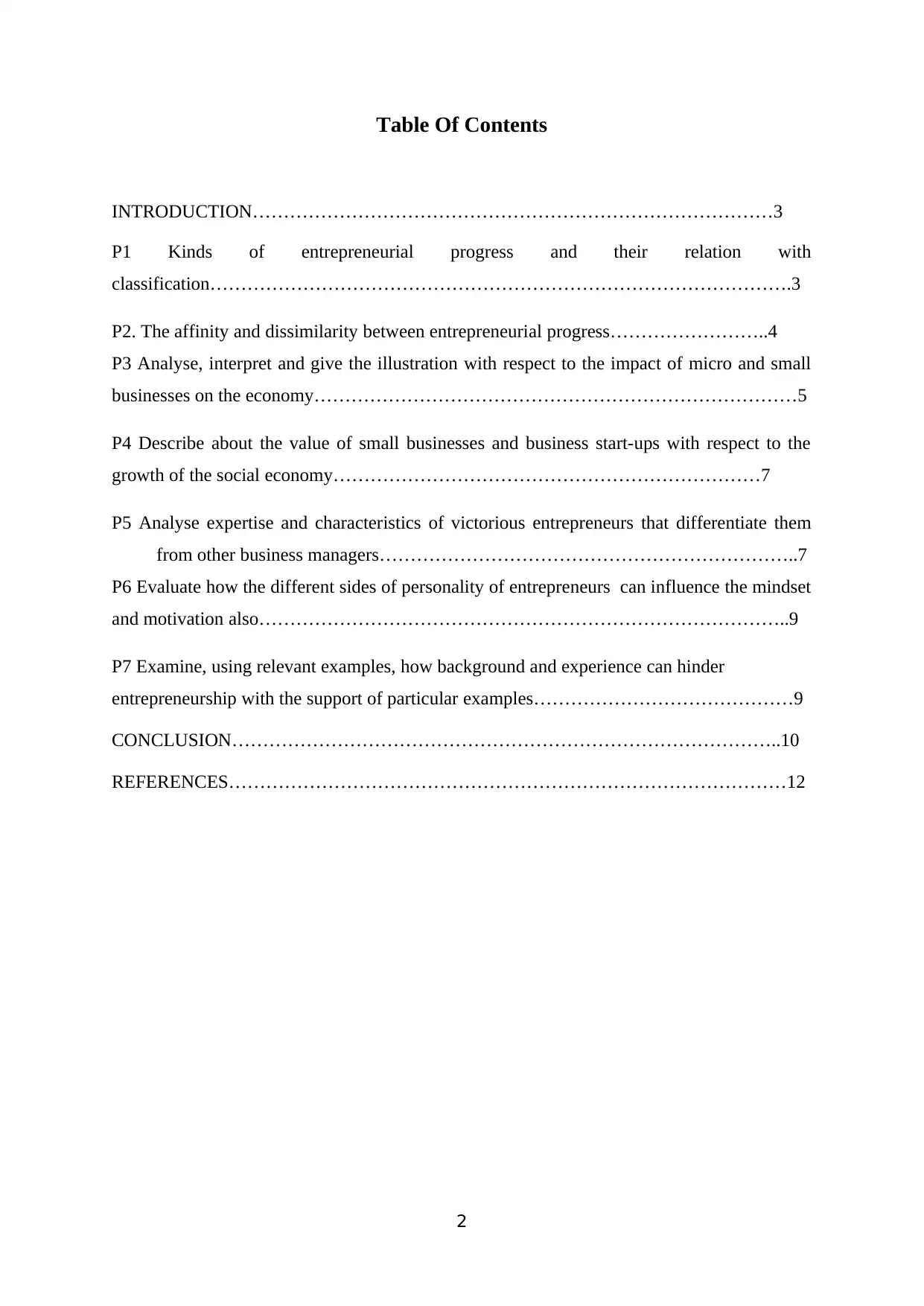
Table Of Contents
INTRODUCTION…………………………………………………………………………3
P1 Kinds of entrepreneurial progress and their relation with
classification………………………………………………………………………………….3
P2. The affinity and dissimilarity between entrepreneurial progress……………………..4
P3 Analyse, interpret and give the illustration with respect to the impact of micro and small
businesses on the economy……………………………………………………………………5
P4 Describe about the value of small businesses and business start-ups with respect to the
growth of the social economy……………………………………………………………7
P5 Analyse expertise and characteristics of victorious entrepreneurs that differentiate them
from other business managers…………………………………………………………..7
P6 Evaluate how the different sides of personality of entrepreneurs can influence the mindset
and motivation also…………………………………………………………………………..9
P7 Examine, using relevant examples, how background and experience can hinder
entrepreneurship with the support of particular examples……………………………………9
CONCLUSION……………………………………………………………………………..10
REFERENCES………………………………………………………………………………12
2
INTRODUCTION…………………………………………………………………………3
P1 Kinds of entrepreneurial progress and their relation with
classification………………………………………………………………………………….3
P2. The affinity and dissimilarity between entrepreneurial progress……………………..4
P3 Analyse, interpret and give the illustration with respect to the impact of micro and small
businesses on the economy……………………………………………………………………5
P4 Describe about the value of small businesses and business start-ups with respect to the
growth of the social economy……………………………………………………………7
P5 Analyse expertise and characteristics of victorious entrepreneurs that differentiate them
from other business managers…………………………………………………………..7
P6 Evaluate how the different sides of personality of entrepreneurs can influence the mindset
and motivation also…………………………………………………………………………..9
P7 Examine, using relevant examples, how background and experience can hinder
entrepreneurship with the support of particular examples……………………………………9
CONCLUSION……………………………………………………………………………..10
REFERENCES………………………………………………………………………………12
2
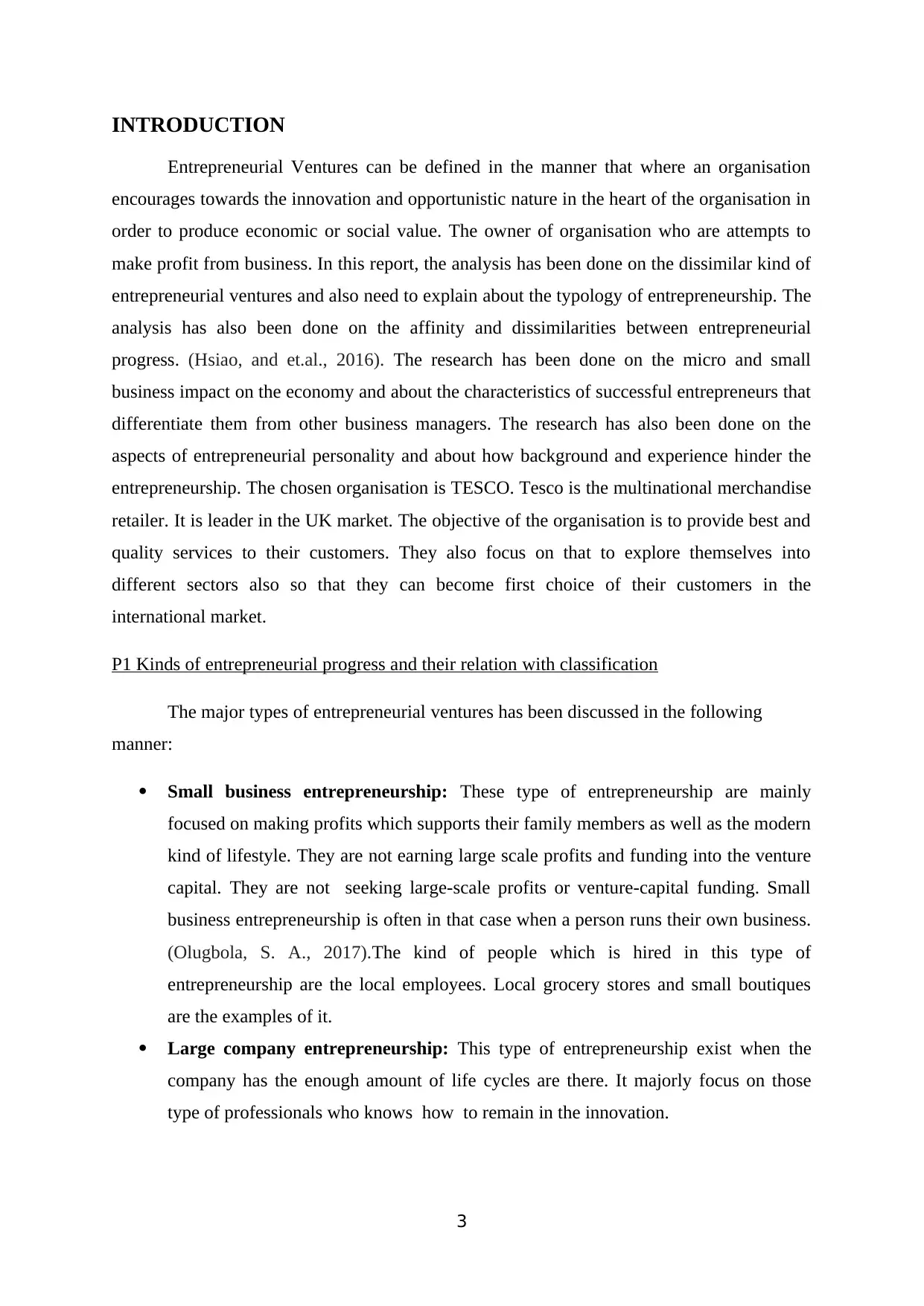
INTRODUCTION
Entrepreneurial Ventures can be defined in the manner that where an organisation
encourages towards the innovation and opportunistic nature in the heart of the organisation in
order to produce economic or social value. The owner of organisation who are attempts to
make profit from business. In this report, the analysis has been done on the dissimilar kind of
entrepreneurial ventures and also need to explain about the typology of entrepreneurship. The
analysis has also been done on the affinity and dissimilarities between entrepreneurial
progress. (Hsiao, and et.al., 2016). The research has been done on the micro and small
business impact on the economy and about the characteristics of successful entrepreneurs that
differentiate them from other business managers. The research has also been done on the
aspects of entrepreneurial personality and about how background and experience hinder the
entrepreneurship. The chosen organisation is TESCO. Tesco is the multinational merchandise
retailer. It is leader in the UK market. The objective of the organisation is to provide best and
quality services to their customers. They also focus on that to explore themselves into
different sectors also so that they can become first choice of their customers in the
international market.
P1 Kinds of entrepreneurial progress and their relation with classification
The major types of entrepreneurial ventures has been discussed in the following
manner:
Small business entrepreneurship: These type of entrepreneurship are mainly
focused on making profits which supports their family members as well as the modern
kind of lifestyle. They are not earning large scale profits and funding into the venture
capital. They are not seeking large-scale profits or venture-capital funding. Small
business entrepreneurship is often in that case when a person runs their own business.
(Olugbola, S. A., 2017).The kind of people which is hired in this type of
entrepreneurship are the local employees. Local grocery stores and small boutiques
are the examples of it.
Large company entrepreneurship: This type of entrepreneurship exist when the
company has the enough amount of life cycles are there. It majorly focus on those
type of professionals who knows how to remain in the innovation.
3
Entrepreneurial Ventures can be defined in the manner that where an organisation
encourages towards the innovation and opportunistic nature in the heart of the organisation in
order to produce economic or social value. The owner of organisation who are attempts to
make profit from business. In this report, the analysis has been done on the dissimilar kind of
entrepreneurial ventures and also need to explain about the typology of entrepreneurship. The
analysis has also been done on the affinity and dissimilarities between entrepreneurial
progress. (Hsiao, and et.al., 2016). The research has been done on the micro and small
business impact on the economy and about the characteristics of successful entrepreneurs that
differentiate them from other business managers. The research has also been done on the
aspects of entrepreneurial personality and about how background and experience hinder the
entrepreneurship. The chosen organisation is TESCO. Tesco is the multinational merchandise
retailer. It is leader in the UK market. The objective of the organisation is to provide best and
quality services to their customers. They also focus on that to explore themselves into
different sectors also so that they can become first choice of their customers in the
international market.
P1 Kinds of entrepreneurial progress and their relation with classification
The major types of entrepreneurial ventures has been discussed in the following
manner:
Small business entrepreneurship: These type of entrepreneurship are mainly
focused on making profits which supports their family members as well as the modern
kind of lifestyle. They are not earning large scale profits and funding into the venture
capital. They are not seeking large-scale profits or venture-capital funding. Small
business entrepreneurship is often in that case when a person runs their own business.
(Olugbola, S. A., 2017).The kind of people which is hired in this type of
entrepreneurship are the local employees. Local grocery stores and small boutiques
are the examples of it.
Large company entrepreneurship: This type of entrepreneurship exist when the
company has the enough amount of life cycles are there. It majorly focus on those
type of professionals who knows how to remain in the innovation.
3
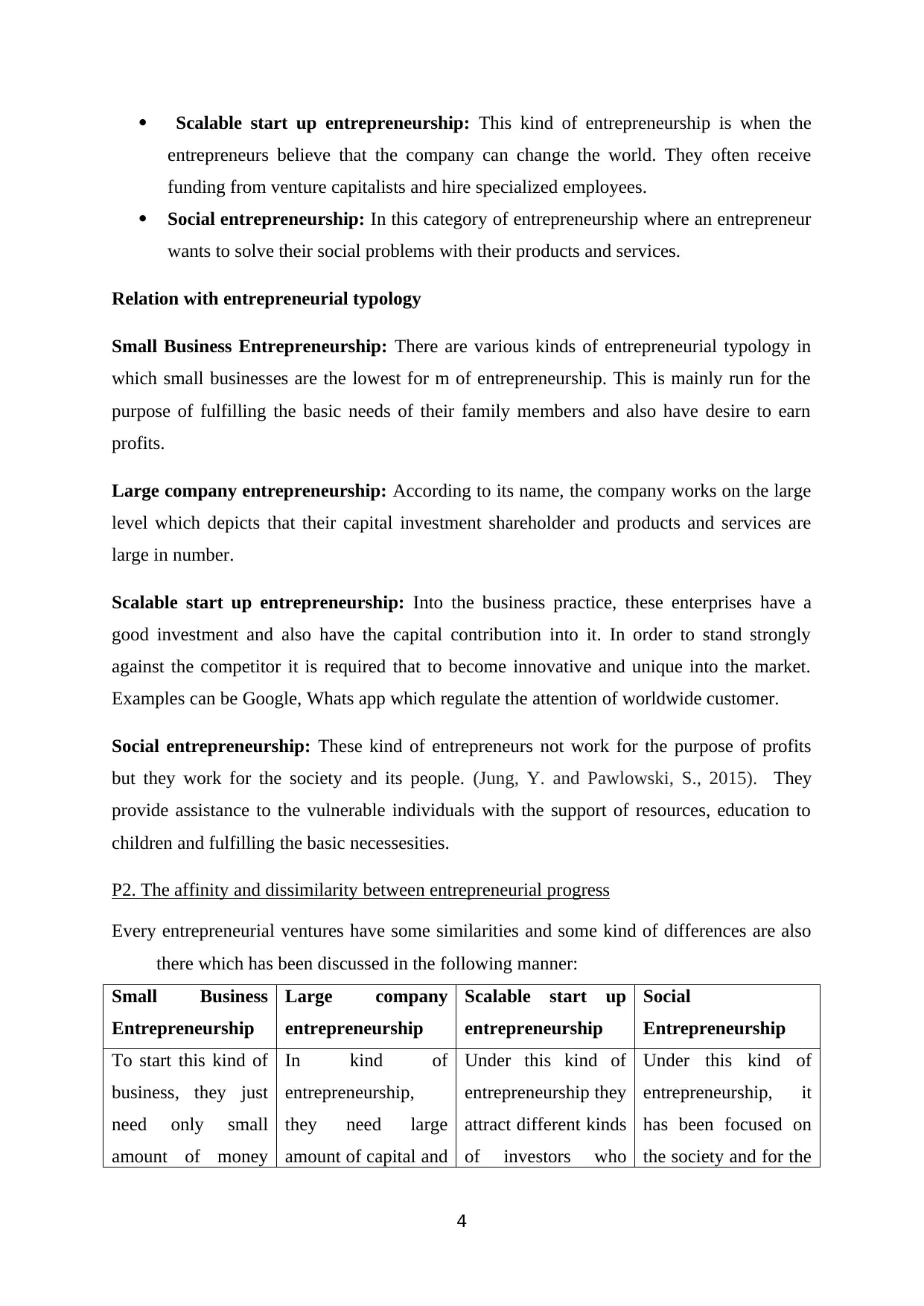
Scalable start up entrepreneurship: This kind of entrepreneurship is when the
entrepreneurs believe that the company can change the world. They often receive
funding from venture capitalists and hire specialized employees.
Social entrepreneurship: In this category of entrepreneurship where an entrepreneur
wants to solve their social problems with their products and services.
Relation with entrepreneurial typology
Small Business Entrepreneurship: There are various kinds of entrepreneurial typology in
which small businesses are the lowest for m of entrepreneurship. This is mainly run for the
purpose of fulfilling the basic needs of their family members and also have desire to earn
profits.
Large company entrepreneurship: According to its name, the company works on the large
level which depicts that their capital investment shareholder and products and services are
large in number.
Scalable start up entrepreneurship: Into the business practice, these enterprises have a
good investment and also have the capital contribution into it. In order to stand strongly
against the competitor it is required that to become innovative and unique into the market.
Examples can be Google, Whats app which regulate the attention of worldwide customer.
Social entrepreneurship: These kind of entrepreneurs not work for the purpose of profits
but they work for the society and its people. (Jung, Y. and Pawlowski, S., 2015). They
provide assistance to the vulnerable individuals with the support of resources, education to
children and fulfilling the basic necessesities.
P2. The affinity and dissimilarity between entrepreneurial progress
Every entrepreneurial ventures have some similarities and some kind of differences are also
there which has been discussed in the following manner:
Small Business
Entrepreneurship
Large company
entrepreneurship
Scalable start up
entrepreneurship
Social
Entrepreneurship
To start this kind of
business, they just
need only small
amount of money
In kind of
entrepreneurship,
they need large
amount of capital and
Under this kind of
entrepreneurship they
attract different kinds
of investors who
Under this kind of
entrepreneurship, it
has been focused on
the society and for the
4
entrepreneurs believe that the company can change the world. They often receive
funding from venture capitalists and hire specialized employees.
Social entrepreneurship: In this category of entrepreneurship where an entrepreneur
wants to solve their social problems with their products and services.
Relation with entrepreneurial typology
Small Business Entrepreneurship: There are various kinds of entrepreneurial typology in
which small businesses are the lowest for m of entrepreneurship. This is mainly run for the
purpose of fulfilling the basic needs of their family members and also have desire to earn
profits.
Large company entrepreneurship: According to its name, the company works on the large
level which depicts that their capital investment shareholder and products and services are
large in number.
Scalable start up entrepreneurship: Into the business practice, these enterprises have a
good investment and also have the capital contribution into it. In order to stand strongly
against the competitor it is required that to become innovative and unique into the market.
Examples can be Google, Whats app which regulate the attention of worldwide customer.
Social entrepreneurship: These kind of entrepreneurs not work for the purpose of profits
but they work for the society and its people. (Jung, Y. and Pawlowski, S., 2015). They
provide assistance to the vulnerable individuals with the support of resources, education to
children and fulfilling the basic necessesities.
P2. The affinity and dissimilarity between entrepreneurial progress
Every entrepreneurial ventures have some similarities and some kind of differences are also
there which has been discussed in the following manner:
Small Business
Entrepreneurship
Large company
entrepreneurship
Scalable start up
entrepreneurship
Social
Entrepreneurship
To start this kind of
business, they just
need only small
amount of money
In kind of
entrepreneurship,
they need large
amount of capital and
Under this kind of
entrepreneurship they
attract different kinds
of investors who
Under this kind of
entrepreneurship, it
has been focused on
the society and for the
4
Secure Best Marks with AI Grader
Need help grading? Try our AI Grader for instant feedback on your assignments.
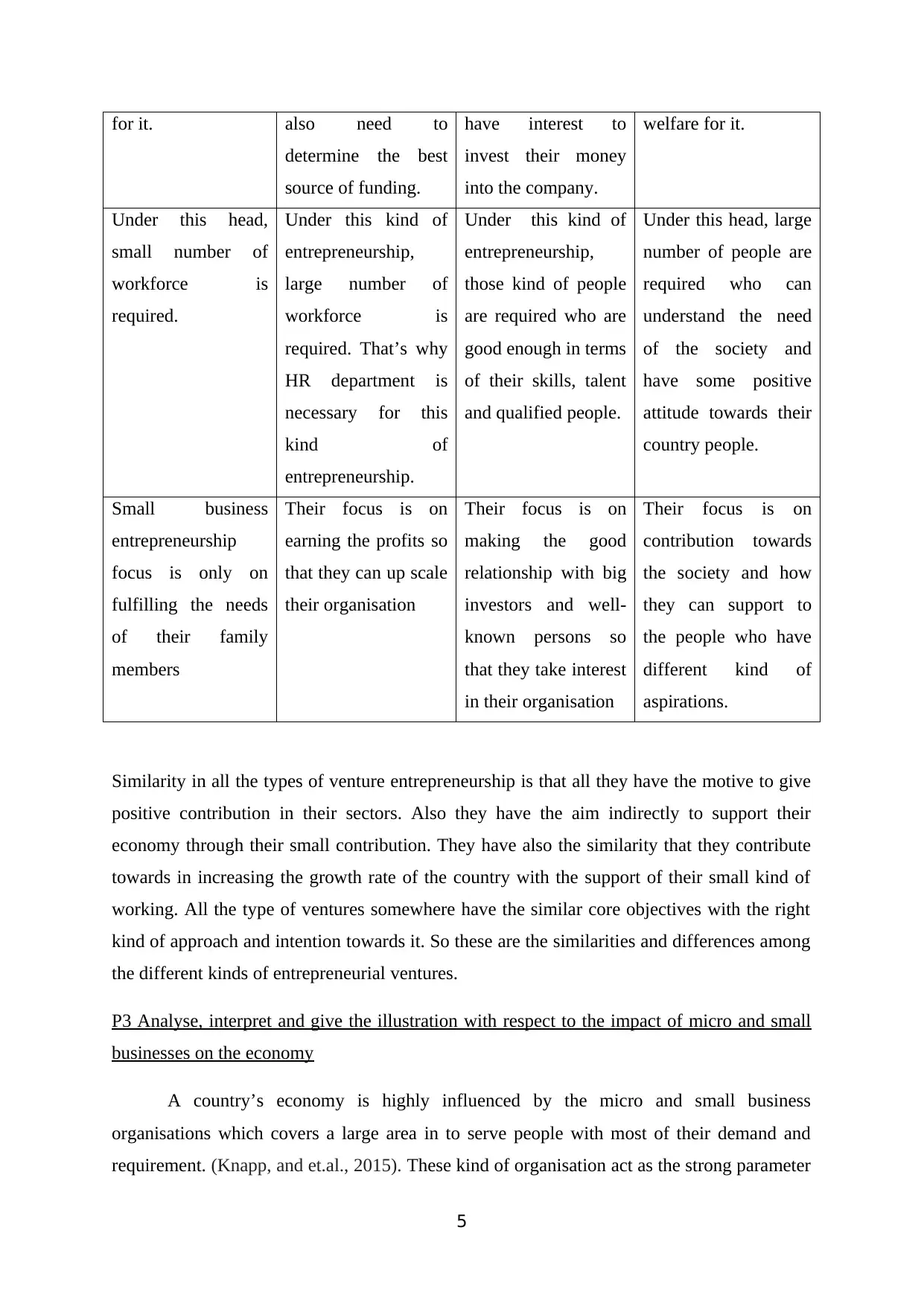
for it. also need to
determine the best
source of funding.
have interest to
invest their money
into the company.
welfare for it.
Under this head,
small number of
workforce is
required.
Under this kind of
entrepreneurship,
large number of
workforce is
required. That’s why
HR department is
necessary for this
kind of
entrepreneurship.
Under this kind of
entrepreneurship,
those kind of people
are required who are
good enough in terms
of their skills, talent
and qualified people.
Under this head, large
number of people are
required who can
understand the need
of the society and
have some positive
attitude towards their
country people.
Small business
entrepreneurship
focus is only on
fulfilling the needs
of their family
members
Their focus is on
earning the profits so
that they can up scale
their organisation
Their focus is on
making the good
relationship with big
investors and well-
known persons so
that they take interest
in their organisation
Their focus is on
contribution towards
the society and how
they can support to
the people who have
different kind of
aspirations.
Similarity in all the types of venture entrepreneurship is that all they have the motive to give
positive contribution in their sectors. Also they have the aim indirectly to support their
economy through their small contribution. They have also the similarity that they contribute
towards in increasing the growth rate of the country with the support of their small kind of
working. All the type of ventures somewhere have the similar core objectives with the right
kind of approach and intention towards it. So these are the similarities and differences among
the different kinds of entrepreneurial ventures.
P3 Analyse, interpret and give the illustration with respect to the impact of micro and small
businesses on the economy
A country’s economy is highly influenced by the micro and small business
organisations which covers a large area in to serve people with most of their demand and
requirement. (Knapp, and et.al., 2015). These kind of organisation act as the strong parameter
5
determine the best
source of funding.
have interest to
invest their money
into the company.
welfare for it.
Under this head,
small number of
workforce is
required.
Under this kind of
entrepreneurship,
large number of
workforce is
required. That’s why
HR department is
necessary for this
kind of
entrepreneurship.
Under this kind of
entrepreneurship,
those kind of people
are required who are
good enough in terms
of their skills, talent
and qualified people.
Under this head, large
number of people are
required who can
understand the need
of the society and
have some positive
attitude towards their
country people.
Small business
entrepreneurship
focus is only on
fulfilling the needs
of their family
members
Their focus is on
earning the profits so
that they can up scale
their organisation
Their focus is on
making the good
relationship with big
investors and well-
known persons so
that they take interest
in their organisation
Their focus is on
contribution towards
the society and how
they can support to
the people who have
different kind of
aspirations.
Similarity in all the types of venture entrepreneurship is that all they have the motive to give
positive contribution in their sectors. Also they have the aim indirectly to support their
economy through their small contribution. They have also the similarity that they contribute
towards in increasing the growth rate of the country with the support of their small kind of
working. All the type of ventures somewhere have the similar core objectives with the right
kind of approach and intention towards it. So these are the similarities and differences among
the different kinds of entrepreneurial ventures.
P3 Analyse, interpret and give the illustration with respect to the impact of micro and small
businesses on the economy
A country’s economy is highly influenced by the micro and small business
organisations which covers a large area in to serve people with most of their demand and
requirement. (Knapp, and et.al., 2015). These kind of organisation act as the strong parameter
5
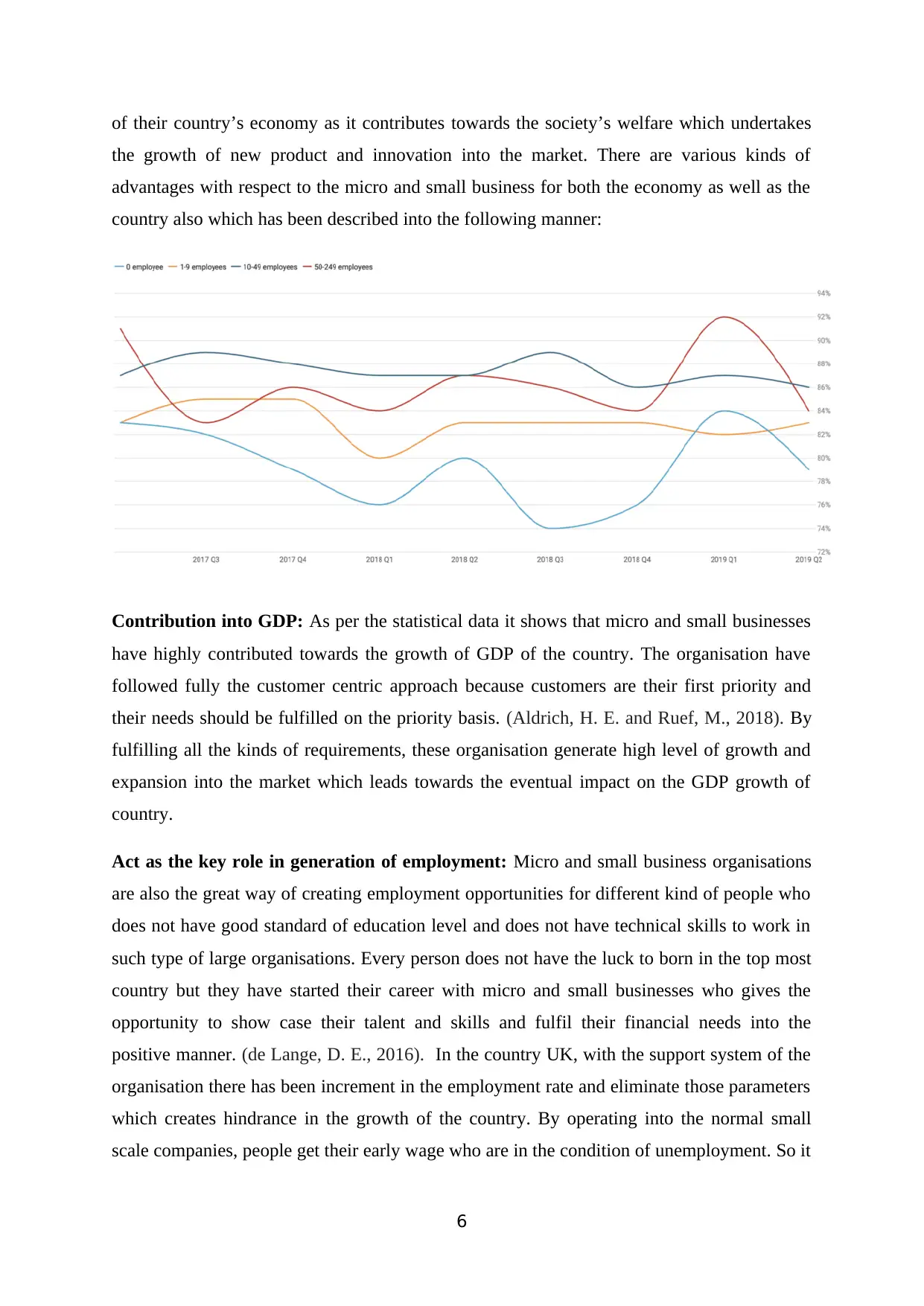
of their country’s economy as it contributes towards the society’s welfare which undertakes
the growth of new product and innovation into the market. There are various kinds of
advantages with respect to the micro and small business for both the economy as well as the
country also which has been described into the following manner:
Contribution into GDP: As per the statistical data it shows that micro and small businesses
have highly contributed towards the growth of GDP of the country. The organisation have
followed fully the customer centric approach because customers are their first priority and
their needs should be fulfilled on the priority basis. (Aldrich, H. E. and Ruef, M., 2018). By
fulfilling all the kinds of requirements, these organisation generate high level of growth and
expansion into the market which leads towards the eventual impact on the GDP growth of
country.
Act as the key role in generation of employment: Micro and small business organisations
are also the great way of creating employment opportunities for different kind of people who
does not have good standard of education level and does not have technical skills to work in
such type of large organisations. Every person does not have the luck to born in the top most
country but they have started their career with micro and small businesses who gives the
opportunity to show case their talent and skills and fulfil their financial needs into the
positive manner. (de Lange, D. E., 2016). In the country UK, with the support system of the
organisation there has been increment in the employment rate and eliminate those parameters
which creates hindrance in the growth of the country. By operating into the normal small
scale companies, people get their early wage who are in the condition of unemployment. So it
6
the growth of new product and innovation into the market. There are various kinds of
advantages with respect to the micro and small business for both the economy as well as the
country also which has been described into the following manner:
Contribution into GDP: As per the statistical data it shows that micro and small businesses
have highly contributed towards the growth of GDP of the country. The organisation have
followed fully the customer centric approach because customers are their first priority and
their needs should be fulfilled on the priority basis. (Aldrich, H. E. and Ruef, M., 2018). By
fulfilling all the kinds of requirements, these organisation generate high level of growth and
expansion into the market which leads towards the eventual impact on the GDP growth of
country.
Act as the key role in generation of employment: Micro and small business organisations
are also the great way of creating employment opportunities for different kind of people who
does not have good standard of education level and does not have technical skills to work in
such type of large organisations. Every person does not have the luck to born in the top most
country but they have started their career with micro and small businesses who gives the
opportunity to show case their talent and skills and fulfil their financial needs into the
positive manner. (de Lange, D. E., 2016). In the country UK, with the support system of the
organisation there has been increment in the employment rate and eliminate those parameters
which creates hindrance in the growth of the country. By operating into the normal small
scale companies, people get their early wage who are in the condition of unemployment. So it
6
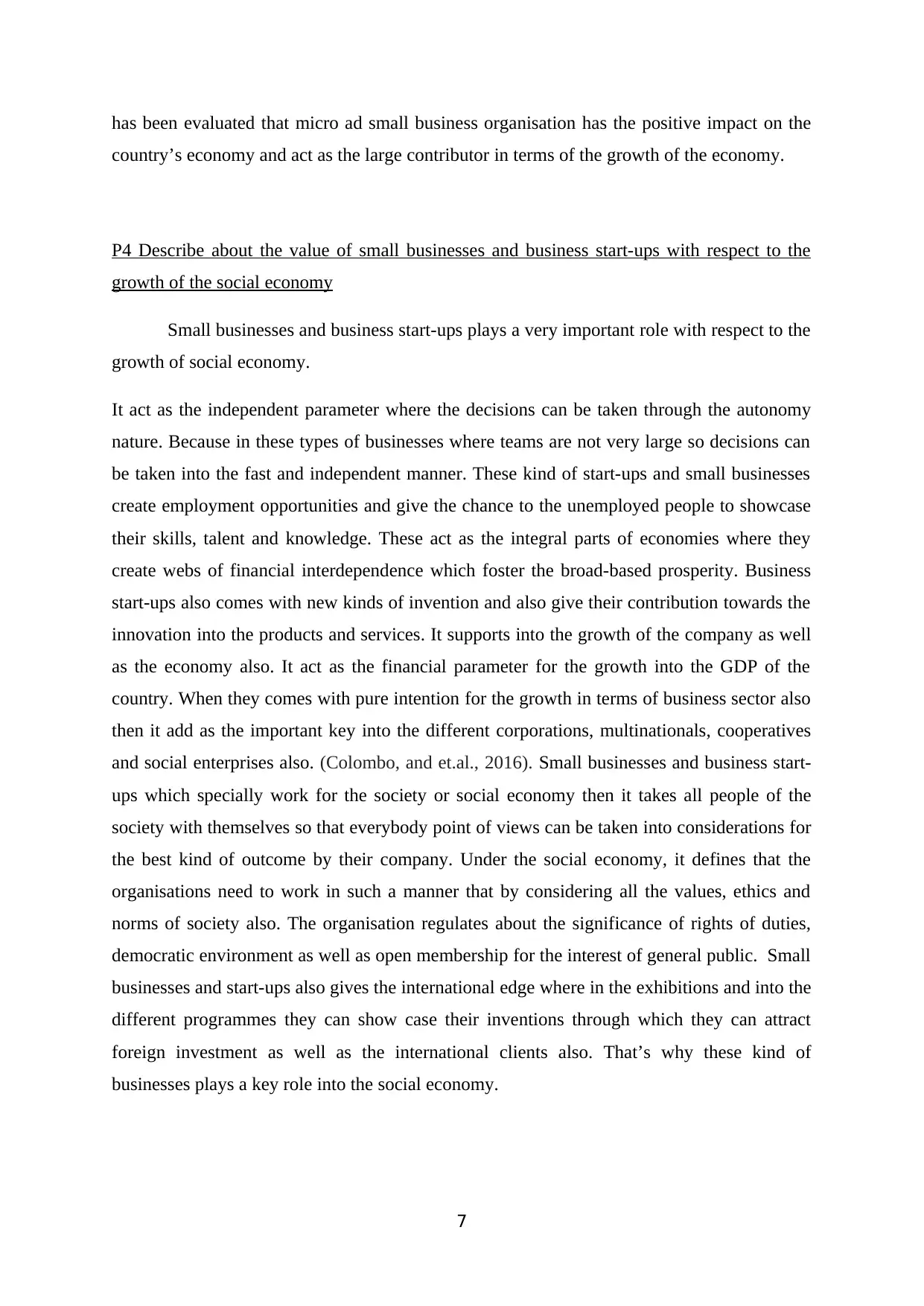
has been evaluated that micro ad small business organisation has the positive impact on the
country’s economy and act as the large contributor in terms of the growth of the economy.
P4 Describe about the value of small businesses and business start-ups with respect to the
growth of the social economy
Small businesses and business start-ups plays a very important role with respect to the
growth of social economy.
It act as the independent parameter where the decisions can be taken through the autonomy
nature. Because in these types of businesses where teams are not very large so decisions can
be taken into the fast and independent manner. These kind of start-ups and small businesses
create employment opportunities and give the chance to the unemployed people to showcase
their skills, talent and knowledge. These act as the integral parts of economies where they
create webs of financial interdependence which foster the broad-based prosperity. Business
start-ups also comes with new kinds of invention and also give their contribution towards the
innovation into the products and services. It supports into the growth of the company as well
as the economy also. It act as the financial parameter for the growth into the GDP of the
country. When they comes with pure intention for the growth in terms of business sector also
then it add as the important key into the different corporations, multinationals, cooperatives
and social enterprises also. (Colombo, and et.al., 2016). Small businesses and business start-
ups which specially work for the society or social economy then it takes all people of the
society with themselves so that everybody point of views can be taken into considerations for
the best kind of outcome by their company. Under the social economy, it defines that the
organisations need to work in such a manner that by considering all the values, ethics and
norms of society also. The organisation regulates about the significance of rights of duties,
democratic environment as well as open membership for the interest of general public. Small
businesses and start-ups also gives the international edge where in the exhibitions and into the
different programmes they can show case their inventions through which they can attract
foreign investment as well as the international clients also. That’s why these kind of
businesses plays a key role into the social economy.
7
country’s economy and act as the large contributor in terms of the growth of the economy.
P4 Describe about the value of small businesses and business start-ups with respect to the
growth of the social economy
Small businesses and business start-ups plays a very important role with respect to the
growth of social economy.
It act as the independent parameter where the decisions can be taken through the autonomy
nature. Because in these types of businesses where teams are not very large so decisions can
be taken into the fast and independent manner. These kind of start-ups and small businesses
create employment opportunities and give the chance to the unemployed people to showcase
their skills, talent and knowledge. These act as the integral parts of economies where they
create webs of financial interdependence which foster the broad-based prosperity. Business
start-ups also comes with new kinds of invention and also give their contribution towards the
innovation into the products and services. It supports into the growth of the company as well
as the economy also. It act as the financial parameter for the growth into the GDP of the
country. When they comes with pure intention for the growth in terms of business sector also
then it add as the important key into the different corporations, multinationals, cooperatives
and social enterprises also. (Colombo, and et.al., 2016). Small businesses and business start-
ups which specially work for the society or social economy then it takes all people of the
society with themselves so that everybody point of views can be taken into considerations for
the best kind of outcome by their company. Under the social economy, it defines that the
organisations need to work in such a manner that by considering all the values, ethics and
norms of society also. The organisation regulates about the significance of rights of duties,
democratic environment as well as open membership for the interest of general public. Small
businesses and start-ups also gives the international edge where in the exhibitions and into the
different programmes they can show case their inventions through which they can attract
foreign investment as well as the international clients also. That’s why these kind of
businesses plays a key role into the social economy.
7
Paraphrase This Document
Need a fresh take? Get an instant paraphrase of this document with our AI Paraphraser
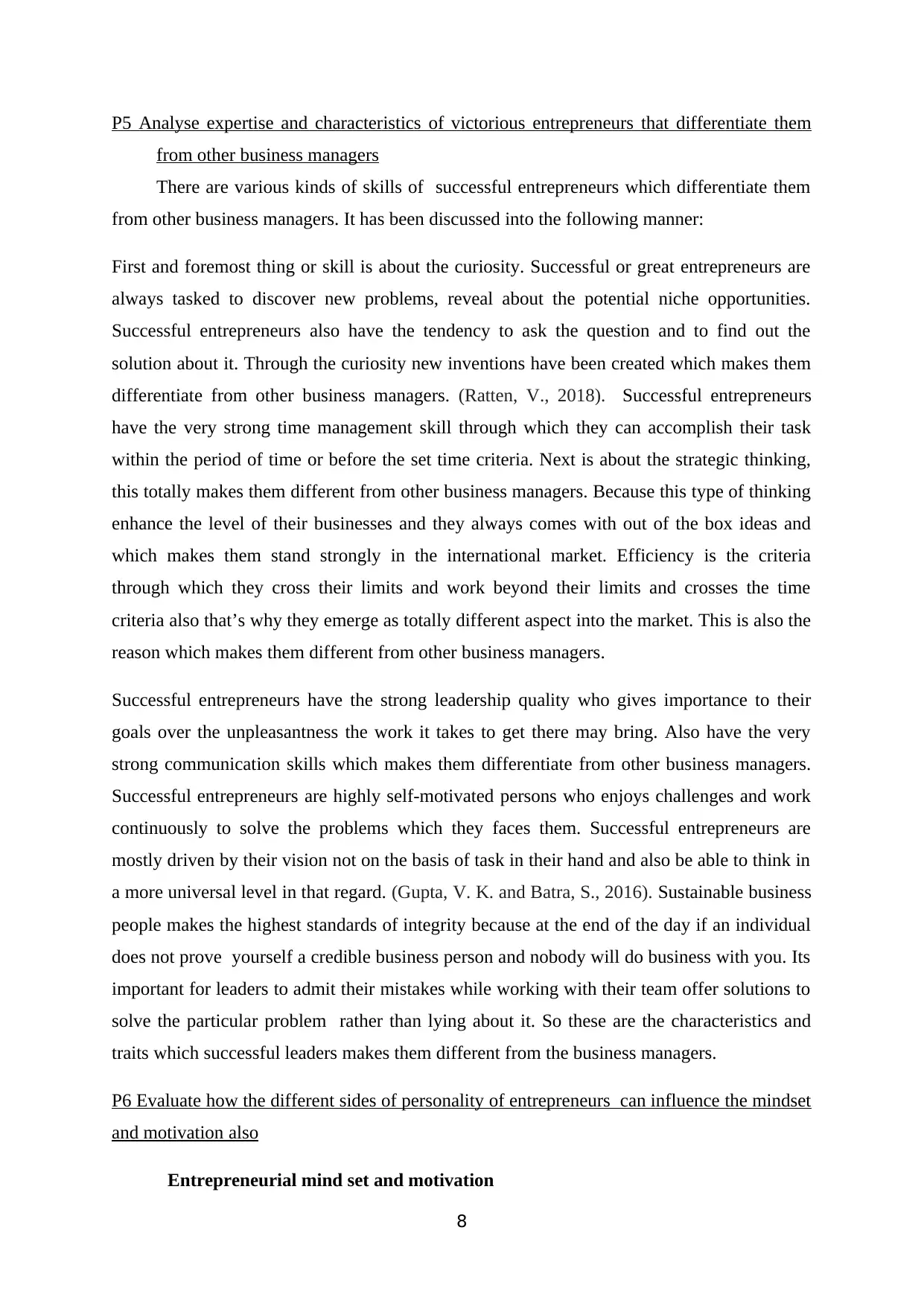
P5 Analyse expertise and characteristics of victorious entrepreneurs that differentiate them
from other business managers
There are various kinds of skills of successful entrepreneurs which differentiate them
from other business managers. It has been discussed into the following manner:
First and foremost thing or skill is about the curiosity. Successful or great entrepreneurs are
always tasked to discover new problems, reveal about the potential niche opportunities.
Successful entrepreneurs also have the tendency to ask the question and to find out the
solution about it. Through the curiosity new inventions have been created which makes them
differentiate from other business managers. (Ratten, V., 2018). Successful entrepreneurs
have the very strong time management skill through which they can accomplish their task
within the period of time or before the set time criteria. Next is about the strategic thinking,
this totally makes them different from other business managers. Because this type of thinking
enhance the level of their businesses and they always comes with out of the box ideas and
which makes them stand strongly in the international market. Efficiency is the criteria
through which they cross their limits and work beyond their limits and crosses the time
criteria also that’s why they emerge as totally different aspect into the market. This is also the
reason which makes them different from other business managers.
Successful entrepreneurs have the strong leadership quality who gives importance to their
goals over the unpleasantness the work it takes to get there may bring. Also have the very
strong communication skills which makes them differentiate from other business managers.
Successful entrepreneurs are highly self-motivated persons who enjoys challenges and work
continuously to solve the problems which they faces them. Successful entrepreneurs are
mostly driven by their vision not on the basis of task in their hand and also be able to think in
a more universal level in that regard. (Gupta, V. K. and Batra, S., 2016). Sustainable business
people makes the highest standards of integrity because at the end of the day if an individual
does not prove yourself a credible business person and nobody will do business with you. Its
important for leaders to admit their mistakes while working with their team offer solutions to
solve the particular problem rather than lying about it. So these are the characteristics and
traits which successful leaders makes them different from the business managers.
P6 Evaluate how the different sides of personality of entrepreneurs can influence the mindset
and motivation also
Entrepreneurial mind set and motivation
8
from other business managers
There are various kinds of skills of successful entrepreneurs which differentiate them
from other business managers. It has been discussed into the following manner:
First and foremost thing or skill is about the curiosity. Successful or great entrepreneurs are
always tasked to discover new problems, reveal about the potential niche opportunities.
Successful entrepreneurs also have the tendency to ask the question and to find out the
solution about it. Through the curiosity new inventions have been created which makes them
differentiate from other business managers. (Ratten, V., 2018). Successful entrepreneurs
have the very strong time management skill through which they can accomplish their task
within the period of time or before the set time criteria. Next is about the strategic thinking,
this totally makes them different from other business managers. Because this type of thinking
enhance the level of their businesses and they always comes with out of the box ideas and
which makes them stand strongly in the international market. Efficiency is the criteria
through which they cross their limits and work beyond their limits and crosses the time
criteria also that’s why they emerge as totally different aspect into the market. This is also the
reason which makes them different from other business managers.
Successful entrepreneurs have the strong leadership quality who gives importance to their
goals over the unpleasantness the work it takes to get there may bring. Also have the very
strong communication skills which makes them differentiate from other business managers.
Successful entrepreneurs are highly self-motivated persons who enjoys challenges and work
continuously to solve the problems which they faces them. Successful entrepreneurs are
mostly driven by their vision not on the basis of task in their hand and also be able to think in
a more universal level in that regard. (Gupta, V. K. and Batra, S., 2016). Sustainable business
people makes the highest standards of integrity because at the end of the day if an individual
does not prove yourself a credible business person and nobody will do business with you. Its
important for leaders to admit their mistakes while working with their team offer solutions to
solve the particular problem rather than lying about it. So these are the characteristics and
traits which successful leaders makes them different from the business managers.
P6 Evaluate how the different sides of personality of entrepreneurs can influence the mindset
and motivation also
Entrepreneurial mind set and motivation
8
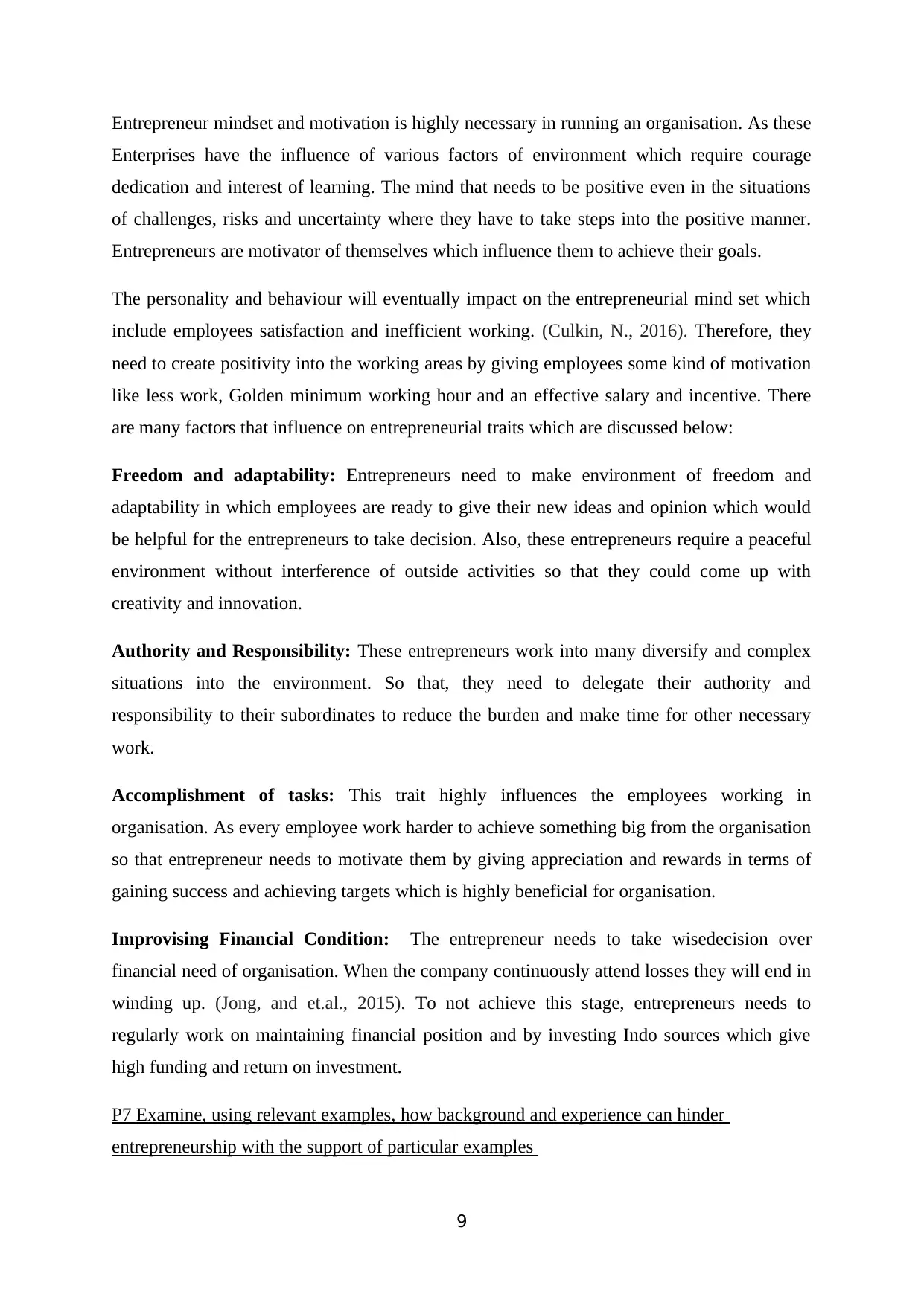
Entrepreneur mindset and motivation is highly necessary in running an organisation. As these
Enterprises have the influence of various factors of environment which require courage
dedication and interest of learning. The mind that needs to be positive even in the situations
of challenges, risks and uncertainty where they have to take steps into the positive manner.
Entrepreneurs are motivator of themselves which influence them to achieve their goals.
The personality and behaviour will eventually impact on the entrepreneurial mind set which
include employees satisfaction and inefficient working. (Culkin, N., 2016). Therefore, they
need to create positivity into the working areas by giving employees some kind of motivation
like less work, Golden minimum working hour and an effective salary and incentive. There
are many factors that influence on entrepreneurial traits which are discussed below:
Freedom and adaptability: Entrepreneurs need to make environment of freedom and
adaptability in which employees are ready to give their new ideas and opinion which would
be helpful for the entrepreneurs to take decision. Also, these entrepreneurs require a peaceful
environment without interference of outside activities so that they could come up with
creativity and innovation.
Authority and Responsibility: These entrepreneurs work into many diversify and complex
situations into the environment. So that, they need to delegate their authority and
responsibility to their subordinates to reduce the burden and make time for other necessary
work.
Accomplishment of tasks: This trait highly influences the employees working in
organisation. As every employee work harder to achieve something big from the organisation
so that entrepreneur needs to motivate them by giving appreciation and rewards in terms of
gaining success and achieving targets which is highly beneficial for organisation.
Improvising Financial Condition: The entrepreneur needs to take wisedecision over
financial need of organisation. When the company continuously attend losses they will end in
winding up. (Jong, and et.al., 2015). To not achieve this stage, entrepreneurs needs to
regularly work on maintaining financial position and by investing Indo sources which give
high funding and return on investment.
P7 Examine, using relevant examples, how background and experience can hinder
entrepreneurship with the support of particular examples
9
Enterprises have the influence of various factors of environment which require courage
dedication and interest of learning. The mind that needs to be positive even in the situations
of challenges, risks and uncertainty where they have to take steps into the positive manner.
Entrepreneurs are motivator of themselves which influence them to achieve their goals.
The personality and behaviour will eventually impact on the entrepreneurial mind set which
include employees satisfaction and inefficient working. (Culkin, N., 2016). Therefore, they
need to create positivity into the working areas by giving employees some kind of motivation
like less work, Golden minimum working hour and an effective salary and incentive. There
are many factors that influence on entrepreneurial traits which are discussed below:
Freedom and adaptability: Entrepreneurs need to make environment of freedom and
adaptability in which employees are ready to give their new ideas and opinion which would
be helpful for the entrepreneurs to take decision. Also, these entrepreneurs require a peaceful
environment without interference of outside activities so that they could come up with
creativity and innovation.
Authority and Responsibility: These entrepreneurs work into many diversify and complex
situations into the environment. So that, they need to delegate their authority and
responsibility to their subordinates to reduce the burden and make time for other necessary
work.
Accomplishment of tasks: This trait highly influences the employees working in
organisation. As every employee work harder to achieve something big from the organisation
so that entrepreneur needs to motivate them by giving appreciation and rewards in terms of
gaining success and achieving targets which is highly beneficial for organisation.
Improvising Financial Condition: The entrepreneur needs to take wisedecision over
financial need of organisation. When the company continuously attend losses they will end in
winding up. (Jong, and et.al., 2015). To not achieve this stage, entrepreneurs needs to
regularly work on maintaining financial position and by investing Indo sources which give
high funding and return on investment.
P7 Examine, using relevant examples, how background and experience can hinder
entrepreneurship with the support of particular examples
9
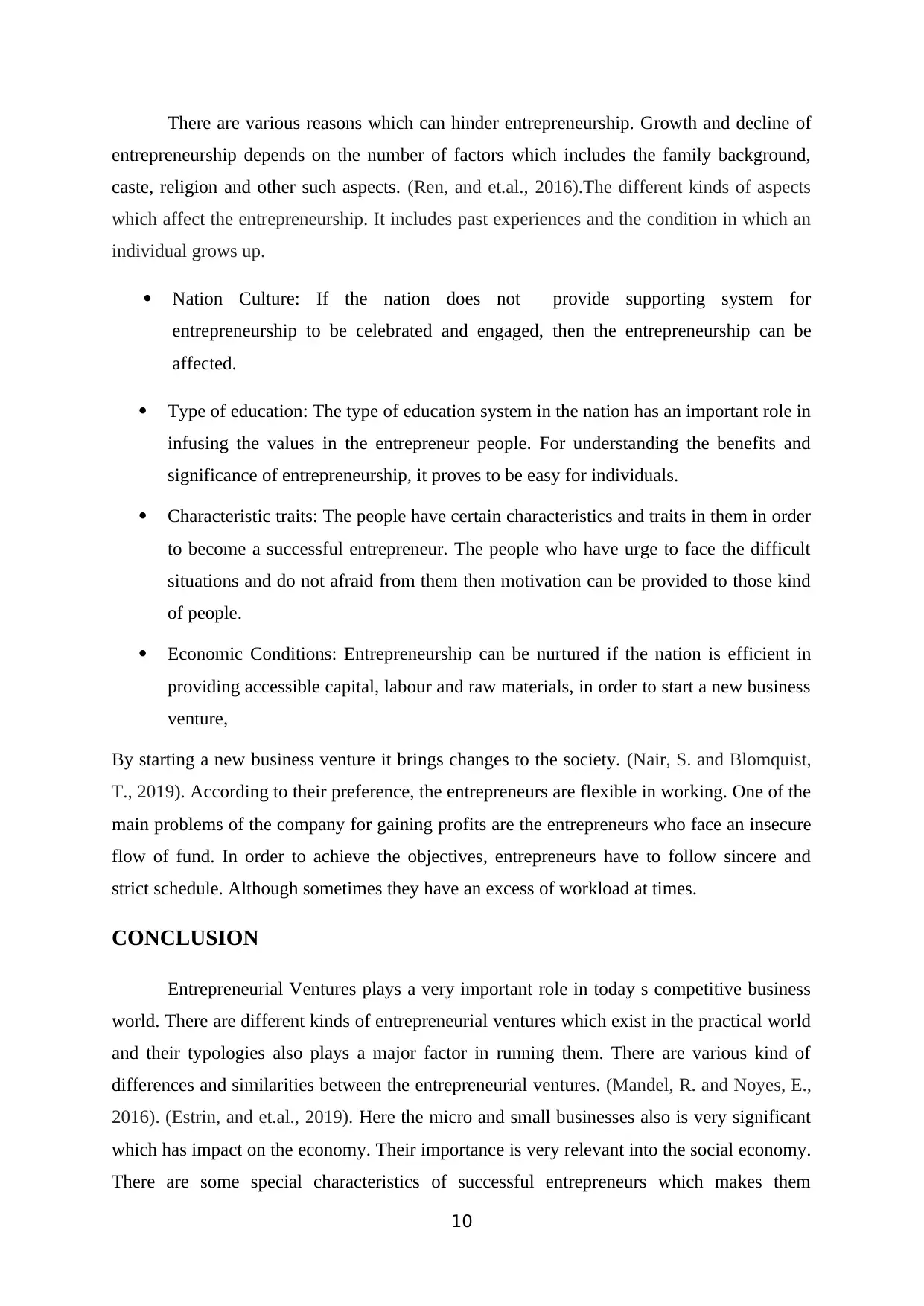
There are various reasons which can hinder entrepreneurship. Growth and decline of
entrepreneurship depends on the number of factors which includes the family background,
caste, religion and other such aspects. (Ren, and et.al., 2016).The different kinds of aspects
which affect the entrepreneurship. It includes past experiences and the condition in which an
individual grows up.
Nation Culture: If the nation does not provide supporting system for
entrepreneurship to be celebrated and engaged, then the entrepreneurship can be
affected.
Type of education: The type of education system in the nation has an important role in
infusing the values in the entrepreneur people. For understanding the benefits and
significance of entrepreneurship, it proves to be easy for individuals.
Characteristic traits: The people have certain characteristics and traits in them in order
to become a successful entrepreneur. The people who have urge to face the difficult
situations and do not afraid from them then motivation can be provided to those kind
of people.
Economic Conditions: Entrepreneurship can be nurtured if the nation is efficient in
providing accessible capital, labour and raw materials, in order to start a new business
venture,
By starting a new business venture it brings changes to the society. (Nair, S. and Blomquist,
T., 2019). According to their preference, the entrepreneurs are flexible in working. One of the
main problems of the company for gaining profits are the entrepreneurs who face an insecure
flow of fund. In order to achieve the objectives, entrepreneurs have to follow sincere and
strict schedule. Although sometimes they have an excess of workload at times.
CONCLUSION
Entrepreneurial Ventures plays a very important role in today s competitive business
world. There are different kinds of entrepreneurial ventures which exist in the practical world
and their typologies also plays a major factor in running them. There are various kind of
differences and similarities between the entrepreneurial ventures. (Mandel, R. and Noyes, E.,
2016). (Estrin, and et.al., 2019). Here the micro and small businesses also is very significant
which has impact on the economy. Their importance is very relevant into the social economy.
There are some special characteristics of successful entrepreneurs which makes them
10
entrepreneurship depends on the number of factors which includes the family background,
caste, religion and other such aspects. (Ren, and et.al., 2016).The different kinds of aspects
which affect the entrepreneurship. It includes past experiences and the condition in which an
individual grows up.
Nation Culture: If the nation does not provide supporting system for
entrepreneurship to be celebrated and engaged, then the entrepreneurship can be
affected.
Type of education: The type of education system in the nation has an important role in
infusing the values in the entrepreneur people. For understanding the benefits and
significance of entrepreneurship, it proves to be easy for individuals.
Characteristic traits: The people have certain characteristics and traits in them in order
to become a successful entrepreneur. The people who have urge to face the difficult
situations and do not afraid from them then motivation can be provided to those kind
of people.
Economic Conditions: Entrepreneurship can be nurtured if the nation is efficient in
providing accessible capital, labour and raw materials, in order to start a new business
venture,
By starting a new business venture it brings changes to the society. (Nair, S. and Blomquist,
T., 2019). According to their preference, the entrepreneurs are flexible in working. One of the
main problems of the company for gaining profits are the entrepreneurs who face an insecure
flow of fund. In order to achieve the objectives, entrepreneurs have to follow sincere and
strict schedule. Although sometimes they have an excess of workload at times.
CONCLUSION
Entrepreneurial Ventures plays a very important role in today s competitive business
world. There are different kinds of entrepreneurial ventures which exist in the practical world
and their typologies also plays a major factor in running them. There are various kind of
differences and similarities between the entrepreneurial ventures. (Mandel, R. and Noyes, E.,
2016). (Estrin, and et.al., 2019). Here the micro and small businesses also is very significant
which has impact on the economy. Their importance is very relevant into the social economy.
There are some special characteristics of successful entrepreneurs which makes them
10
Secure Best Marks with AI Grader
Need help grading? Try our AI Grader for instant feedback on your assignments.
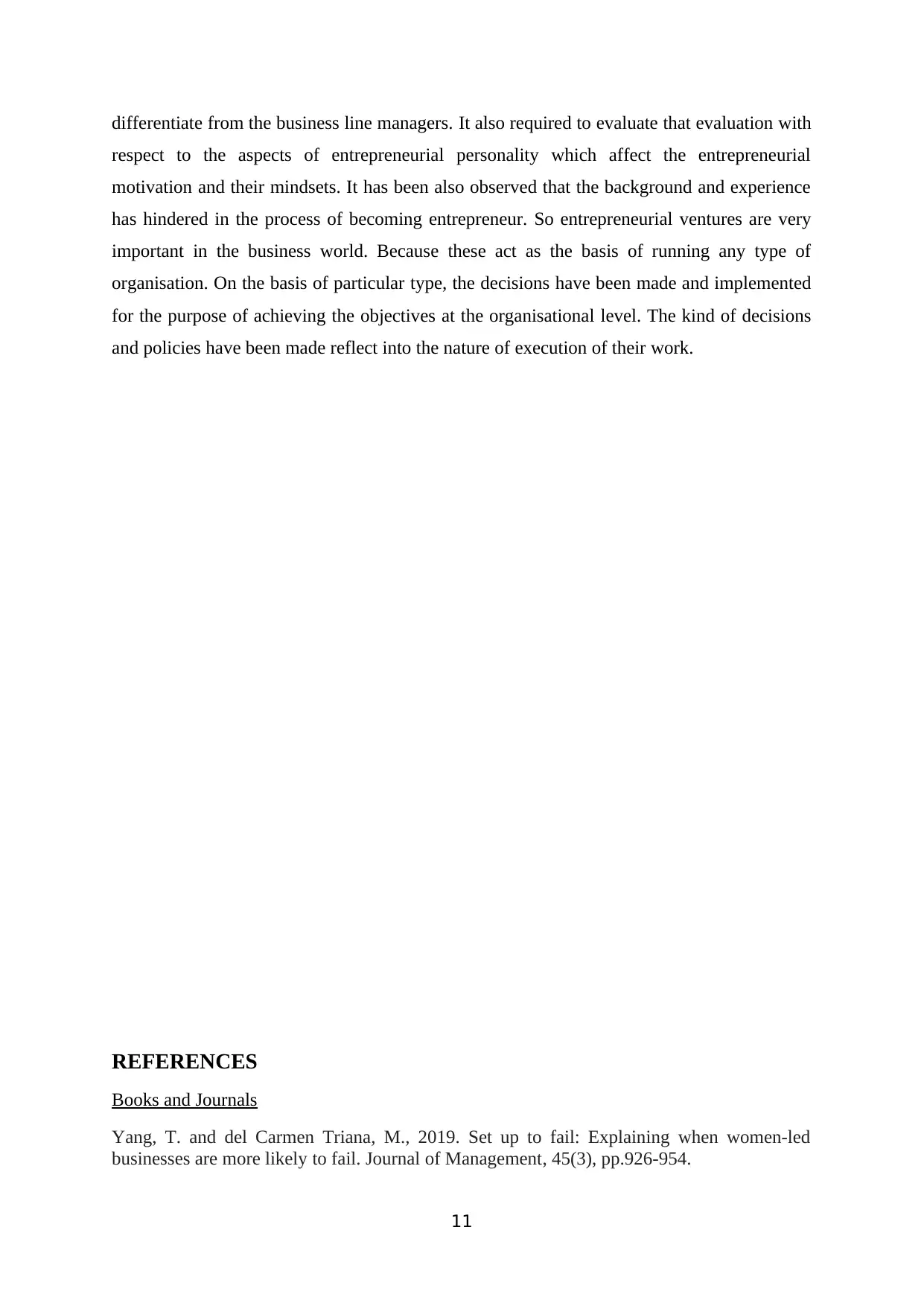
differentiate from the business line managers. It also required to evaluate that evaluation with
respect to the aspects of entrepreneurial personality which affect the entrepreneurial
motivation and their mindsets. It has been also observed that the background and experience
has hindered in the process of becoming entrepreneur. So entrepreneurial ventures are very
important in the business world. Because these act as the basis of running any type of
organisation. On the basis of particular type, the decisions have been made and implemented
for the purpose of achieving the objectives at the organisational level. The kind of decisions
and policies have been made reflect into the nature of execution of their work.
REFERENCES
Books and Journals
Yang, T. and del Carmen Triana, M., 2019. Set up to fail: Explaining when women-led
businesses are more likely to fail. Journal of Management, 45(3), pp.926-954.
11
respect to the aspects of entrepreneurial personality which affect the entrepreneurial
motivation and their mindsets. It has been also observed that the background and experience
has hindered in the process of becoming entrepreneur. So entrepreneurial ventures are very
important in the business world. Because these act as the basis of running any type of
organisation. On the basis of particular type, the decisions have been made and implemented
for the purpose of achieving the objectives at the organisational level. The kind of decisions
and policies have been made reflect into the nature of execution of their work.
REFERENCES
Books and Journals
Yang, T. and del Carmen Triana, M., 2019. Set up to fail: Explaining when women-led
businesses are more likely to fail. Journal of Management, 45(3), pp.926-954.
11
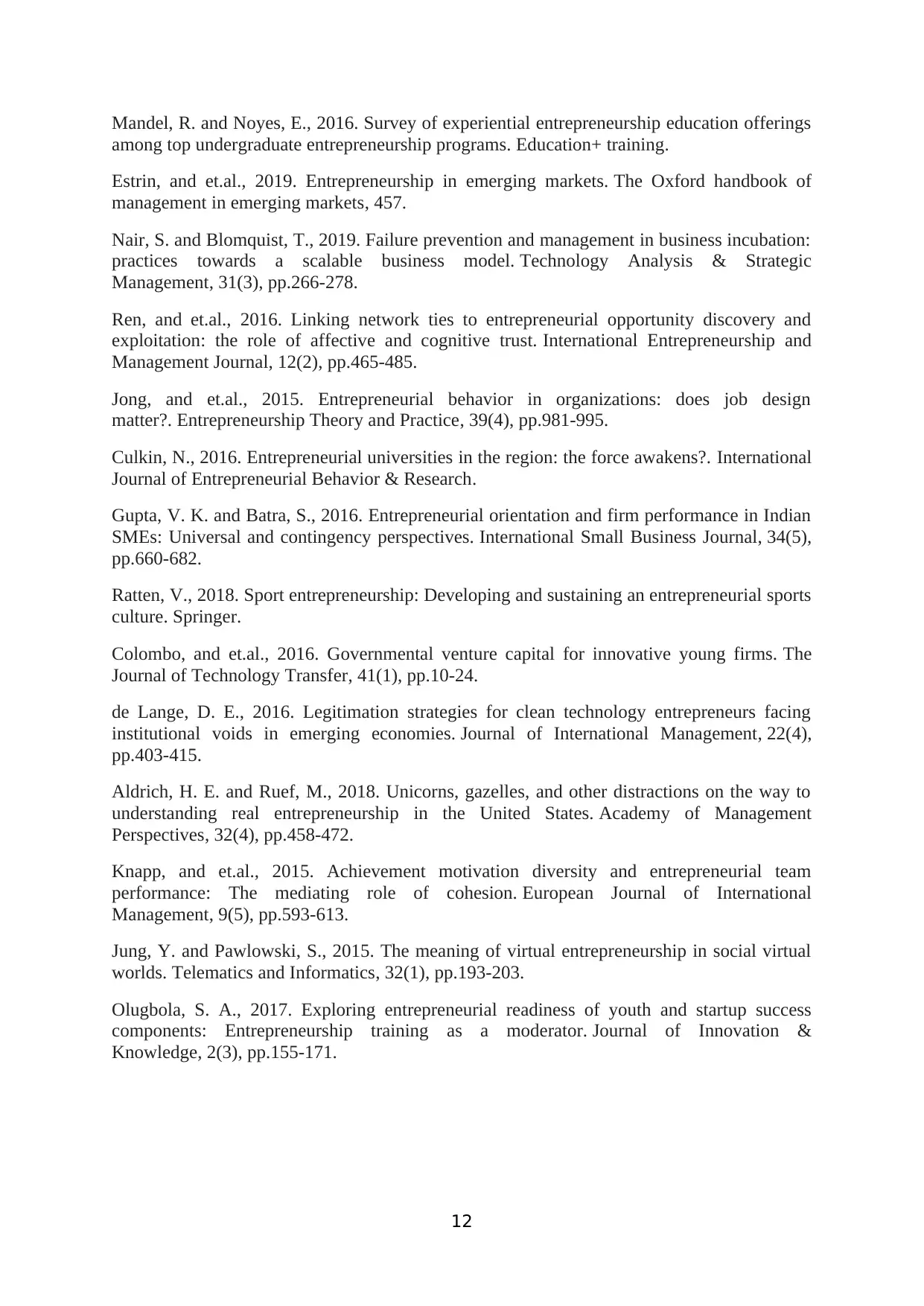
Mandel, R. and Noyes, E., 2016. Survey of experiential entrepreneurship education offerings
among top undergraduate entrepreneurship programs. Education+ training.
Estrin, and et.al., 2019. Entrepreneurship in emerging markets. The Oxford handbook of
management in emerging markets, 457.
Nair, S. and Blomquist, T., 2019. Failure prevention and management in business incubation:
practices towards a scalable business model. Technology Analysis & Strategic
Management, 31(3), pp.266-278.
Ren, and et.al., 2016. Linking network ties to entrepreneurial opportunity discovery and
exploitation: the role of affective and cognitive trust. International Entrepreneurship and
Management Journal, 12(2), pp.465-485.
Jong, and et.al., 2015. Entrepreneurial behavior in organizations: does job design
matter?. Entrepreneurship Theory and Practice, 39(4), pp.981-995.
Culkin, N., 2016. Entrepreneurial universities in the region: the force awakens?. International
Journal of Entrepreneurial Behavior & Research.
Gupta, V. K. and Batra, S., 2016. Entrepreneurial orientation and firm performance in Indian
SMEs: Universal and contingency perspectives. International Small Business Journal, 34(5),
pp.660-682.
Ratten, V., 2018. Sport entrepreneurship: Developing and sustaining an entrepreneurial sports
culture. Springer.
Colombo, and et.al., 2016. Governmental venture capital for innovative young firms. The
Journal of Technology Transfer, 41(1), pp.10-24.
de Lange, D. E., 2016. Legitimation strategies for clean technology entrepreneurs facing
institutional voids in emerging economies. Journal of International Management, 22(4),
pp.403-415.
Aldrich, H. E. and Ruef, M., 2018. Unicorns, gazelles, and other distractions on the way to
understanding real entrepreneurship in the United States. Academy of Management
Perspectives, 32(4), pp.458-472.
Knapp, and et.al., 2015. Achievement motivation diversity and entrepreneurial team
performance: The mediating role of cohesion. European Journal of International
Management, 9(5), pp.593-613.
Jung, Y. and Pawlowski, S., 2015. The meaning of virtual entrepreneurship in social virtual
worlds. Telematics and Informatics, 32(1), pp.193-203.
Olugbola, S. A., 2017. Exploring entrepreneurial readiness of youth and startup success
components: Entrepreneurship training as a moderator. Journal of Innovation &
Knowledge, 2(3), pp.155-171.
12
among top undergraduate entrepreneurship programs. Education+ training.
Estrin, and et.al., 2019. Entrepreneurship in emerging markets. The Oxford handbook of
management in emerging markets, 457.
Nair, S. and Blomquist, T., 2019. Failure prevention and management in business incubation:
practices towards a scalable business model. Technology Analysis & Strategic
Management, 31(3), pp.266-278.
Ren, and et.al., 2016. Linking network ties to entrepreneurial opportunity discovery and
exploitation: the role of affective and cognitive trust. International Entrepreneurship and
Management Journal, 12(2), pp.465-485.
Jong, and et.al., 2015. Entrepreneurial behavior in organizations: does job design
matter?. Entrepreneurship Theory and Practice, 39(4), pp.981-995.
Culkin, N., 2016. Entrepreneurial universities in the region: the force awakens?. International
Journal of Entrepreneurial Behavior & Research.
Gupta, V. K. and Batra, S., 2016. Entrepreneurial orientation and firm performance in Indian
SMEs: Universal and contingency perspectives. International Small Business Journal, 34(5),
pp.660-682.
Ratten, V., 2018. Sport entrepreneurship: Developing and sustaining an entrepreneurial sports
culture. Springer.
Colombo, and et.al., 2016. Governmental venture capital for innovative young firms. The
Journal of Technology Transfer, 41(1), pp.10-24.
de Lange, D. E., 2016. Legitimation strategies for clean technology entrepreneurs facing
institutional voids in emerging economies. Journal of International Management, 22(4),
pp.403-415.
Aldrich, H. E. and Ruef, M., 2018. Unicorns, gazelles, and other distractions on the way to
understanding real entrepreneurship in the United States. Academy of Management
Perspectives, 32(4), pp.458-472.
Knapp, and et.al., 2015. Achievement motivation diversity and entrepreneurial team
performance: The mediating role of cohesion. European Journal of International
Management, 9(5), pp.593-613.
Jung, Y. and Pawlowski, S., 2015. The meaning of virtual entrepreneurship in social virtual
worlds. Telematics and Informatics, 32(1), pp.193-203.
Olugbola, S. A., 2017. Exploring entrepreneurial readiness of youth and startup success
components: Entrepreneurship training as a moderator. Journal of Innovation &
Knowledge, 2(3), pp.155-171.
12

13
1 out of 13
Related Documents
Your All-in-One AI-Powered Toolkit for Academic Success.
+13062052269
info@desklib.com
Available 24*7 on WhatsApp / Email
![[object Object]](/_next/static/media/star-bottom.7253800d.svg)
Unlock your academic potential
© 2024 | Zucol Services PVT LTD | All rights reserved.





